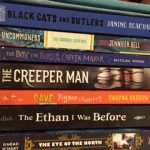Recently, two authors asked me – independently of one another – what exactly I do each day. At first I thought the question was challenging (in that I appeared to do nothing) and I got quite a fright. Once they clarified and I realised they were simply curious, I thought a blog might shed some light. So, here is A (Recent) Day in the Life of Agent Nolan By Polly
*
6.15am: Stumble out of bed, make coffee, drink coffee and dress, all without opening eyes and with hope that shoes match and top isn’t on backwards.
6.40am: Drive to coach station. Hear weather forecast twice during this drive but fail to retain detail. Park. Spend five minutes wondering whether to bring umbrella.  Decide to leave it in car. Sprint to the coach, which has materialized during debate about umbrella. Miss coach. (This happens every week.)
Decide to leave it in car. Sprint to the coach, which has materialized during debate about umbrella. Miss coach. (This happens every week.)
Anytime between boarding coach and arriving in London (ie 1.5 to 3.5 hours, depending on traffic into London): READING – and woe-betide anybody who interrupts it. This coach journey is often the only part of the week that gives me a block of undisturbed reading time.  Each time I start a new manuscript, I am hoping for that rare thing: a story that will transport me to a different world entirely. Today’s manuscript is one I called in two weeks ago, having read a succinct, professional query and five opening pages of top-notch writing. Only a couple of chapters in and I’m starting to feel a buzz of excitement. The voice is original and strong, the story compelling. Already I’m thinking about UK editors who will like this and making a mental note to mention it to Sarah (Davies) for her view on whether it will fly in the US. I also use this journey to answer urgent emails (or those that can easily be answered by sausage-fingers-on-a-mobile (ie me)), read queries (to try to keep on top of the never-ending influx) and look at my ‘To Do’ list. (I have a cast-iron stomach when it comes to travelling, but sometimes the length of my To Do list makes me feel queasy.)
Each time I start a new manuscript, I am hoping for that rare thing: a story that will transport me to a different world entirely. Today’s manuscript is one I called in two weeks ago, having read a succinct, professional query and five opening pages of top-notch writing. Only a couple of chapters in and I’m starting to feel a buzz of excitement. The voice is original and strong, the story compelling. Already I’m thinking about UK editors who will like this and making a mental note to mention it to Sarah (Davies) for her view on whether it will fly in the US. I also use this journey to answer urgent emails (or those that can easily be answered by sausage-fingers-on-a-mobile (ie me)), read queries (to try to keep on top of the never-ending influx) and look at my ‘To Do’ list. (I have a cast-iron stomach when it comes to travelling, but sometimes the length of my To Do list makes me feel queasy.)
10am-ish (with luck): Arrive at office. As I work at home a lot, it’s a good and invigorating change to be with creative, book-loving colleagues, not least those at Working Partners and Rights People, with whom Greenhouse shares office space. The office is also a good place to pick up on industry news and gossip (which editors have moved where and why; who might replace them; what our sister companies have sold; what they’re talking to publishers, editors and scouts about; which film or TV company is interested in what) and to share news of deals, cover reveals, great manuscripts and so on. And last night’s TV, of course.
As I’m only in the London office one day per week, I often can’t get to my desk until I’ve dealt with the post that’s accumulated in my absence.  This means books and bound proofs to unpack; contracts to check and either file or forward to authors for signature; invoices to raise. After I’ve cleared enough space to reach my computer and log in, I respond to non-query emails. These come in from all over: authors, editors, publicists, foreign publishers, translators, scouts, film and TV people, people organizing events, contract departments and so on. Some need a single-word reply. Most need thought and time to answer.
This means books and bound proofs to unpack; contracts to check and either file or forward to authors for signature; invoices to raise. After I’ve cleared enough space to reach my computer and log in, I respond to non-query emails. These come in from all over: authors, editors, publicists, foreign publishers, translators, scouts, film and TV people, people organizing events, contract departments and so on. Some need a single-word reply. Most need thought and time to answer.
10.45am: A client turns up, which is always a treat. We leave the office for a meeting at a publishing house nearby. On the way, we discuss their work in progress and attempt to unpick a knotty plotting problem.
The meeting is about publicity and marketing plans for the author’s forthcoming book. It goes well – everybody is on top of plans and full of good ideas. The discussion is open and engaged. There is clarity about what author is expected to do and what the publishing house will do. The only sticky point comes towards the end when the editor breaks the unhappy news that bookshops’ response to the cover visual (which the author and in-house team all like) is negative. This leads to a discussion about how much weight to give to their concerns, how to address them, how this might affect publication schedule.
11.45am: Leave publishing house and go with author for coffee and a debrief. (We both need it!) We discuss the potential ramifications of ignoring the bookshops’ response to the book cover, and also the pros and cons of any potential publication-date change. (Cons include the effect on the author’s financial planning – originally based on receiving the ‘on publication’ advance at a particular time – and on their annual holiday – booked to ensure that the author would be in the country to do PR at original publication time.) This author is an old-hand so isn’t as rattled as a less experienced author might be, but it’s still not easy news to digest.
12.30pm: Say goodbye to (hopefully reassured) author and head to lunch meeting with a Publishing Director. Discuss what she’s looking for for her list, what isn’t working well, what we’re envious of/impressed by that other houses and agents are doing, the market in general. I also take the opportunity to tell her about a couple of client manuscripts I have coming up. Partly this is to whet her appetite and partly it’s to ensure that she’s keen to see what I will be sending out later in the week. Greenhouse prides itself on a honed and strategic approach to getting deals for clients, so it’s vital not to waste anyone’s time by sending out material that isn’t eagerly anticipated. Elegantly drip ketchup on my (white, of course) top. Publishing Director politely pretends not to notice. At least my top is on the right way round.
2pm: Head back to office. On the way, receive a call from a debut author. They’ve just received their first round of editorial notes and feel overwhelmed. Promise to ring them back once in office.
At desk, dig through my correspondence with the author to ensure the detail of their novel is clear in my mind. Working on/thinking about so many different plots and characters, it can be hard to keep track. I also have a terrible memory, which doesn’t help. Ring author and talk through the notes they’ve received: what do they agree with? What has thrown them and why? Do they understand why an editor might have suggested something? What do they think of the suggestion? Assure them of two key things: 1. The editor is motivated only by helping them achieve the best possible book. 2. The editorial process is a discussion. An author isn’t meant to slavishly follow everything an editor says. Discuss how best to give feedback to the editor: does the author want me to ring the editor to talk things through or will the author speak to the editor? Author opts for latter. A good decision.
3pm: Read queries.
3.15pm: Coffee.  End up having to make it for five other people. (Timing is everything when working in an office environment.) Get milk-and-one-sugar request mixed up with milk-and-no-sugar request. In the dog house for a bit.
End up having to make it for five other people. (Timing is everything when working in an office environment.) Get milk-and-one-sugar request mixed up with milk-and-no-sugar request. In the dog house for a bit.
3.20pm: Resume contract negotiation that has been going on for over a week with a wily editor. The editor is sticking on something that I feel is unfair on the author. Who will give in first? What leverage have I got?
Phone author whose contract it is to give them an update and to discuss the ins and outs of the point in question.
3.45pm: Potential client turns up early for a 4pm meeting. Torn between eagerness to see them and silent fuming. Those ‘lost’ 15 minutes were banked as time to run through my editorial notes and to collect my thoughts on their novel. Experience a momentary panic at being unable to remember the book’s title or the protagonist’s name, but at least manage to address author by their name and not that of their main character . . . which I have been known to do in the past . . .
Great editorial meeting. The author is intelligent, engaged and professional. We have lots of debate and discussion over plotting. They are bursting with strong ideas, which always makes an agent’s heart soar.
4.45pm: Read queries.
5pm: Call Sarah (Davies) for a general catch up. We speak several times a week (and several times daily via email), checking in on US/UK market, shared clients and to offer much-needed mutual support in what can sometimes be a frustrating business.
5.15pm: Read queries.
5.30pm: Think about going home.  Look at number of queries in inbox. Decide to do another hour.
Look at number of queries in inbox. Decide to do another hour.
6pm: Somebody in the office mentions ‘wine’. Switch off computer. Put on coat. Grab bag. Remember I’ve promised to send a client thoughts on a manuscript by the end of the week but not printed out their manuscript (I edit the old-fashioned way: on paper, not on screen). Ask for name of pub. Switch machine back on. Find manuscript in Word. Press ‘print’. Wait. Silence. Printer out of paper. Search fruitlessly for key to stationery cupboard. Rattle door in frustration and discover it’s already open. Load paper. Sit waiting for 240 pages to print. Read query emails whilst doing so. Printer jams only twice (less than average).
6.30pm: Restorative glass of wine.
7pm: Walk to coach stop. Starts to rain. Search for umbrella.  Remember umbrella is in car and car is at coach station in Oxford.
Remember umbrella is in car and car is at coach station in Oxford.
8pm: No sign of 8pm coach. Get on 8.20pm coach feeling very damp.
Read query emails for a bit, then switch to reading full manuscripts, hoping to finish the one I started this morning. Unusually, I stay awake for the whole journey. (It’s a very good manuscript!) Can’t wait to contact author to speak further about their writing, future ideas and aspirations. As the coach pulls into Oxford, I am already visualizing that thrilling, humbling moment when, as an agent, I have the privilege of ringing a writer to tell them that they have a publishing deal . . .

